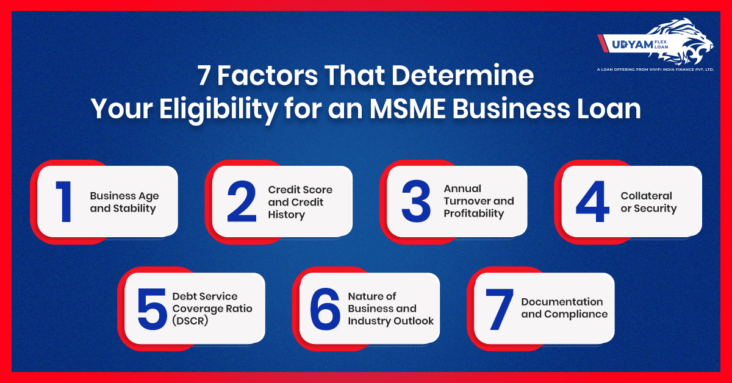7 Factors That Determine Your Eligibility for an MSME Business Loan

In this guide, we’ll break down the seven essential factors that determine whether your MSME qualifies for a business loan, ensuring you’re ready to make a strong case to loan providers.
Top 7 Factors Determining MSME Loan Eligibility
- Business Age and Stability
- Credit Score and Credit History
- Collateral or Security
- Debt Service Coverage Ratio (DSCR)
- Nature of Business and Industry Outlook
- Documentation and Compliance
Loan providers often prefer businesses that have been operational for at least 2-3 years. A longer operational history indicates stability and a proven ability to manage financial challenges. It suggests that your business has a track record of surviving market fluctuations and managing financial obligations.
Quick Tip: For newer businesses, focus on maintaining detailed financial records and building a strong operational track record. Documenting every milestone and financial achievement can help showcase your business’s stability.
Your credit score is a crucial factor in determining loan eligibility. Both your personal and business credit scores reflect your financial reliability and responsibility. A higher credit score typically translates to better loan terms and a higher likelihood of approval.
Quick Tip: Regularly check your credit score and rectify any inaccuracies. Improve your credit score by paying bills on time, reducing outstanding debts, and managing credit responsibly. A solid credit history demonstrates to loan providers that you are a low-risk borrower.
Loan providers assess your business’s annual turnover and profitability to gauge its financial health. Higher turnover and consistent profitability indicate that your business can generate sufficient revenue to cover loan repayments.
Quick Tip: Keep your financial statements accurate and updated. Focus on strategies to increase your turnover and profitability, such as expanding your market reach or optimizing operational efficiencies. Consistent financial health is a strong indicator of your business’s ability to repay the loan.
Collateral refers to assets pledged to secure a loan, which reduces the loan provider’s risk. While many MSME loans are unsecured, offering collateral can improve your eligibility and potentially lead to better loan terms, such as lower interest rates.
Quick Tip: Evaluate your business assets that could serve as collateral, such as property, machinery, or inventory. Ensure that the value of the collateral aligns with the loan amount required. If opting for unsecured loans, focus on strengthening your financial position and credit profile.
The DSCR measures your business’s ability to cover debt payments with its net operating income. A higher DSCR indicates that your business generates enough income to manage its debt obligations, making you a lower-risk borrower.
Quick Tip: Work on improving your DSCR by increasing revenue, reducing expenses, or restructuring existing debt. Maintaining a DSCR of 1.25 or higher demonstrates that your business is capable of handling additional debt.
The type of business you operate and the overall outlook of your industry can influence loan eligibility. Loan providers prefer businesses in stable or growing industries, as they present lower risks.
Quick Tip: Stay informed about industry trends and be prepared to explain how your business plans to adapt to changing market conditions. Highlight any competitive advantages or unique aspects of your business that position you well in the market.
Proper documentation and adherence to regulatory requirements are essential for loan approval. Loan providers require comprehensive paperwork to verify your business’s legitimacy and financial stability.
Quick Tip: Keep all necessary documents, such as business registration certificates, GST registration, income tax returns, bank statements, financial statements, and KYC documents, up to date and readily available. Well-organized documentation can streamline the loan application process.
To Sum Up
Securing an MSME business loan can be a key factor in your enterprise’s growth. By focusing on maintaining a strong credit score, accurate financial records, and a clear business plan, you can enhance your chances of approval. Staying organized and transparent with your loan provider will also contribute to a smoother application process.
To support your MSME’s growth, consider the Udyam Flex Loan from Vivifi India Finance Pvt. Ltd. It’s designed to provide flexible and accessible funding, acting as a true “Business ka Booster” to help your enterprise thrive.
